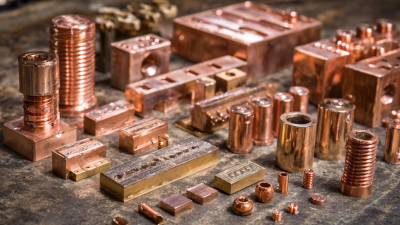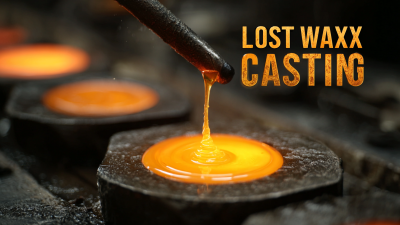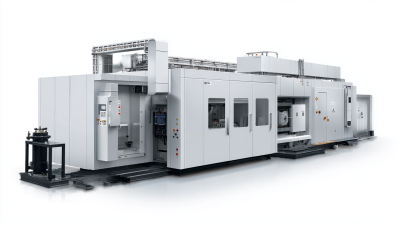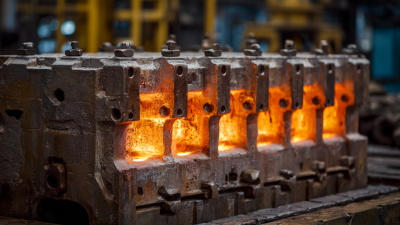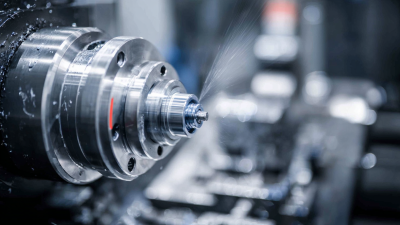In today's highly competitive manufacturing landscape, businesses are constantly seeking innovative solutions to enhance efficiency and reduce costs. One such solution that has gained significant traction is the use of Electrical Copper Castings. According to a report by the International Copper Association, the demand for copper alloys in electrical applications is projected to grow by 5% annually through 2026, highlighting the material's essential role in the industry. Electrical Copper Castings offer a unique combination of conductivity, durability, and versatility, making them an ideal choice for various applications, from electrical connectors to automotive components. By leveraging these castings, companies can not only improve product performance but also achieve a competitive edge in the market.

This blog will explore five essential benefits of using Electrical Copper Castings for your business, emphasizing their importance in driving innovation and efficiency within industrial operations.
Electrical copper castings are increasingly recognized for their durability, making them an essential choice for various industrial applications. The superior mechanical properties of copper, especially when reinforced with high-strength hybrid ceramics, contribute to enhanced performance under demanding conditions. As industries strive for materials that can withstand high temperatures and mechanical stress, the tribo-mechanical stability of copper castings plays a significant role. Research indicates that these castings can resist significant wear and tear while maintaining their electrical conductivity, ensuring reliability over long operational periods.
Moreover, the thermal expansion characteristics of copper are beneficial in applications requiring materials to operate effectively over a wide range of temperatures. The ability to accommodate thermal fluctuations without compromising structural integrity is crucial in manufacturing processes and other industrial sectors. The lightweight and flexible nature of copper also allows for easy integration into existing systems, streamlining operations and reducing costs. With these advantages, incorporating electrical copper castings into business strategies is not just a choice but a forward-thinking solution to meet the evolving demands of the market.
This chart demonstrates the ratings of various essential benefits of using electrical copper castings in industrial applications. Each bar represents the key advantages based on a scale from 1 to 10, indicating the level of effectiveness in industries.
When considering cost-effectiveness in manufacturing, electrical copper castings present a compelling solution for businesses. The initial investment in copper casting might seem high, but the longevity and durability of copper products lead to significant savings over time. The reduced frequency of replacements and maintenance costs allows businesses to allocate their resources more efficiently.
One way to maximize savings is to work closely with a reputable casting supplier. By establishing a relationship with a supplier who understands your specific needs, you can ensure that you’re receiving high-quality castings without incurring unnecessary costs. Additionally, exploring bulk purchase options may lead to even better pricing, giving you an edge in managing your production budget.
Another tip is to consider energy efficiency. Copper’s excellent conductivity means that components made from this metal require less energy to operate effectively, which can drastically reduce the ongoing operational costs. By evaluating the entire lifecycle of your products, from purchase to energy consumption, you can fully appreciate the financial advantages of choosing electrical copper castings for your business.

Electrical copper castings are crucial in optimizing the efficiency of various electrical systems, primarily due to their enhanced conductivity. Copper is recognized for its superior ability to conduct electricity, making it an ideal choice for components that require minimal resistance and maximum performance. The properties of copper allow for the swift transport of electrical signals, which is vital in applications ranging from power generation to telecommunications. By incorporating copper castings into electrical designs, businesses can significantly reduce energy loss, leading to better overall system performance and longevity.
Moreover, the use of electrical copper castings enables manufacturers to produce intricate designs with high precision. This adaptability in production means that components can be tailored to meet specific operational needs without sacrificing efficiency. As systems become increasingly complex, the benefits of utilizing copper castings extend beyond conductivity; they also contribute to overall reliability and durability. This means that businesses can rely on their electrical systems to perform well under various conditions, ensuring that operations run smoothly and effectively. Adopting copper castings is not just an upgrade but a strategic move towards achieving operational excellence in the competitive landscape of modern industry.
| Benefit | Description | Impact on Efficiency |
|---|---|---|
| Enhanced Conductivity | Copper castings provide superior electrical conductivity, ensuring minimal energy loss. | Increases overall system efficiency and performance. |
| Corrosion Resistance | Copper's natural resistance to corrosion extends the life of electrical components. | Reduces maintenance costs and downtime. |
| Thermal Conductivity | Efficient heat dissipation prevents overheating and failure of electrical systems. | Enhances reliability and longevity of equipment. |
| Cost-Effectiveness | Although initial costs may be higher, the durability and efficiency lead to savings over time. | Lower total cost of ownership. |
| Versatility | Can be used in a variety of applications, from small electronics to large industrial systems. | Fosters innovation and adaptability in product design. |
In today's industrial landscape, sustainability is no longer just a trend; it's a crucial pillar for long-term success. Electrical copper castings not only offer superior conductivity and durability but also play a significant role in promoting eco-friendliness. According to a study by the Copper Development Association, recycling copper can save up to 85% of the energy required to mine and process new copper. This remarkable reduction in energy consumption aligns well with global efforts to cut carbon emissions, making copper castings a prudent choice for environmentally conscious businesses.

Moreover, copper is 100% recyclable without any loss of quality, meaning that each time it is recycled, it maintains its inherent properties, contributing to a circular economy. The International Copper Association reports that using recycled copper in manufacturing can significantly decrease environmental impact, as it cuts down on waste generation and resource depletion. By choosing electrical copper castings, businesses can not only enhance their operational efficiency but also demonstrate their commitment to sustainability. This proactive approach can attract eco-conscious customers and help companies meet increasingly stringent regulations regarding environmental protection.
Electrical copper castings offer remarkable versatility in design, making them an ideal choice for businesses looking to tailor products to specific needs. With the capacity for customization, companies can create components that meet exact specifications, ensuring both functionality and aesthetic appeal. This adaptability is particularly beneficial in industries where precision is paramount, allowing for the fine-tuning of designs to accommodate unique requirements. Whether it's intricate shapes for electronic housings or robust components for industrial machinery, electrical copper castings can be molded to suit a wide array of applications.
Moreover, the customization options available with copper castings extend beyond mere shapes. Businesses can choose different finishes, sizes, and even alloy compositions to enhance performance characteristics, such as conductivity and durability. This means that companies can not only achieve the ideal form factor but also optimize the materials used for specific environmental conditions or operational demands. Such flexibility not only improves efficiency but also helps businesses maintain a competitive edge by aligning product offerings more closely with customer expectations.
